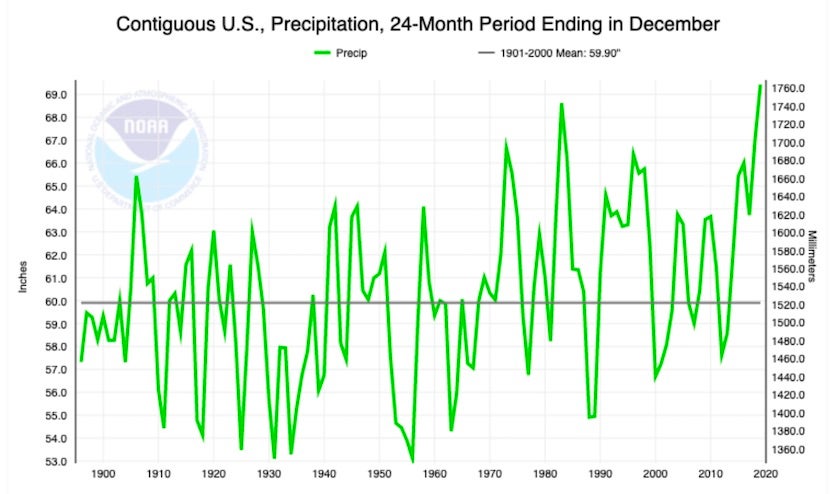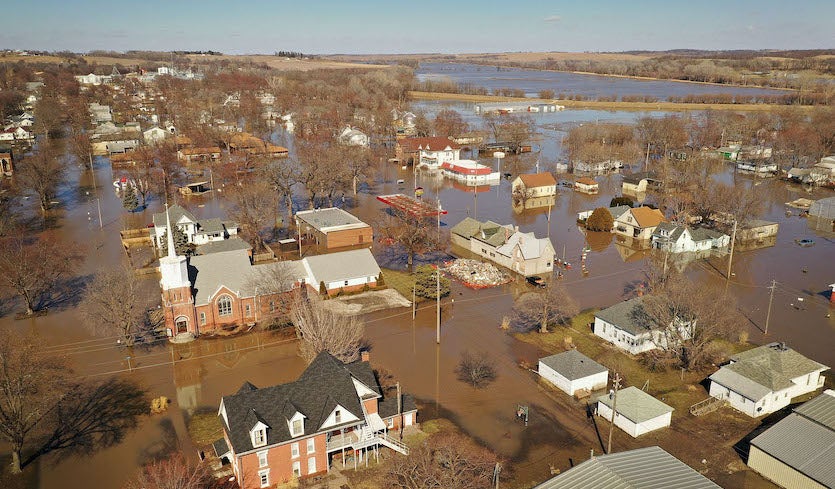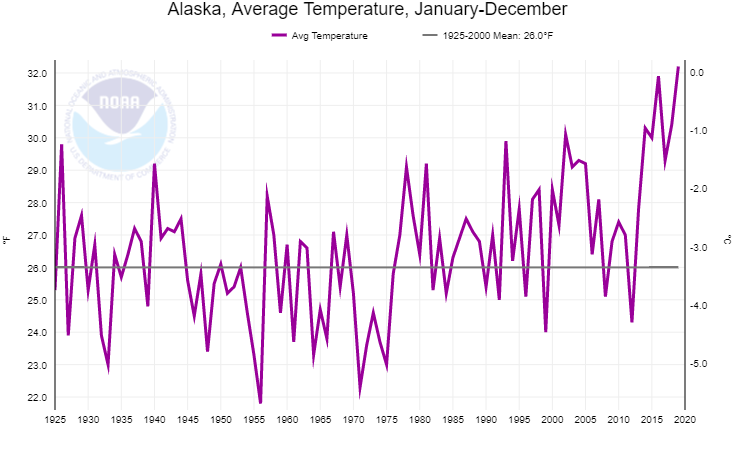Welcome to DU!
The truly grassroots left-of-center political community where regular people, not algorithms, drive the discussions and set the standards.
Join the community:
Create a free account
Support DU (and get rid of ads!):
Become a Star Member
Latest Breaking News
General Discussion
The DU Lounge
All Forums
Issue Forums
Culture Forums
Alliance Forums
Region Forums
Support Forums
Help & Search
Environment & Energy
Related: About this forum2019: 2nd-Wettest Year On Record For US, Hottest Year On Record For Alaska

Precipitation averages in the contiguous U.S. for overlapping two-year calendar periods, 1895-2019. The period 2018-19 was the wettest of these, with 69.43” coming in well above the previous record of 68.62” from 1982-83. Graphic: NOAA / NCEI
Capping a spectacularly soggy period that spanned parts of two calendar years, the contiguous United States saw its second wettest year on record in 2019, according to NOAA’s annual summary issued on Wednesday. The national average temperature wasn’t especially hot by recent standards, but there were landmark heat extremes on either end of the nation, in Alaska and in Florida.
The annual average precipitation for 2019 of 34.78” came in just 0.18” shy of the record-wet year of 1973. However, the last 24 months (see Figure 1 above) easily set a record for the wettest two-year calendar span in data going back to 1895. Moreover, eight of the ten wettest 12-month spans on record for the U.S. fell within 2018 and 2019. […]

Homes and businesses are surrounded by floodwater on 20 March 2019 in Hamburg, Iowa. Several Midwest states battled some of the worst flooding they have experienced in decades as rains and snowmelt triggered by an intense late-winter storm inundated rivers and streams. Photo: Scott Olson / Getty Images
These records were driven by sustained bouts of precipitation that extended from fall 2018 well into 2019. The resulting floods were prolonged and devastating, especially across the Midwest in late March, along the Arkansas River in May and June, and throughout the Mississippi Valley over much of the year. Depending on how the next few weeks unfold, major flooding could recur in the Midwest in spring 2020, based on moisture already in the largely frozen soil along with seasonal outlooks for a wet winter and early spring. Floods unrelated to tropical cyclones accounted for only 3 of the 14 billion-dollar disasters tallied by NOAA in 2019, but they were responsible for almost half (44%) of the total cost of these events. Adjusted for inflation, this year’s tally of billion-dollar disasters was tied for fourth highest in the NOAA database, which goes back to 1980. […]

Alaska average surface temperature for January-December, 1925-2019. 2019 was the first above-freezing year statewide on record. Graphic: NOAA / NCEI
The exceptional heat that dominated most of the year in Alaska—accompanied by periods of record-warm water and record-low sea ice extent in the Bering and Chukchi seas—led to the warmest year on record for the nation’s most northerly state. At 32.2°F (0.1°C), this was the first time in nearly 100 years of recordkeeping that the statewide annual average came in above the freezing mark. The town of Utqiaġvik (formerly Barrow), on Alaska’s north coast, had its warmest year on record—if you can call it warm. The average of 20.8°F made last year the first in Utqiaġvik’s 101 years of recordkeeping to end up above 20°F. [more]
EDIT
https://desdemonadespair.net/2020/01/second-wettest-year-in-u-s-history-warmest-year-on-record-in-alaska.html
InfoView thread info, including edit history
TrashPut this thread in your Trash Can (My DU » Trash Can)
BookmarkAdd this thread to your Bookmarks (My DU » Bookmarks)
0 replies, 439 views
ShareGet links to this post and/or share on social media
AlertAlert this post for a rule violation
PowersThere are no powers you can use on this post
EditCannot edit other people's posts
ReplyReply to this post
EditCannot edit other people's posts
Rec (5)
ReplyReply to this post